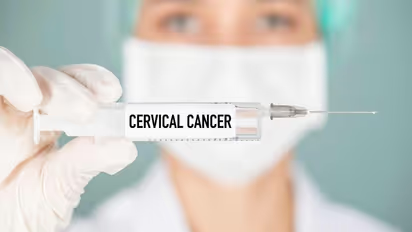Cervical Cancer vaccines: Who should take it - when and why?

Synopsis
We spoke to Dr Amit Kumar Jain, Associate Consultant - Medical Oncology, Fortis Hospital, Bannerghatta Road, who explain us about cervical cancer vaccine called Cervavac which is a quadrivalent vaccine targeting HPV 6,11,16 and 18 and is developed by Serum Institute of India
Cervical cancer: According to GLOBOCAN 2020 data, in India, cervical cancer is the third most common cancer with an incidence of 18.3% (123,907 cases), with a mortality rate of 9.1%, making it the second most common cause of death. According to the National Cancer Registry program, breast cancer, followed by cervical cancer was the most common cancer in women. Out of all the cancers in Indian women, cervical cancer accounts for 6-29%.
Early detection of cervical cancer allows for its prevention and treatment. Human papillomavirus and among that HPV 16 and HPV 18 are the high-risk subtypes that cause the majority of cervical cancer cases. Most cervical cancers are preventable with vaccination against HPV, regular cervical cancer screening, and appropriate follow-up treatment when needed.
Cervical cancer vaccines
Currently, three vaccines are available for the prevention of HPV, namely: Gardasil, Gardasil 9, and Cervarix. Cervarix protects against HPV types 16 and 18; Gardasil protects against types 6, 11, 16 and 18, whereas Gardasil 9 has shown preventive efficacy against 9 HPV subtypes. India now has its first own manufactured cervical cancer vaccine called as Cervavac which is a quadrivalent vaccine targeting HPV 6,11,16 and 18 and is developed by Serum Institute of India
Who should be vaccinated against cervical cancer?
• Presence of several risk factors in people with high-risk HPV infections of the cervix can lead to serious changes in cervical cells that can ultimately evolve into a cancer.
• Cervical cancer vaccination is recommended for women with potential risk factors.
• Women with autoimmune diseases, weakened immune systems, taking immunosuppressive drugs and Organ transplant recipients
• Heavy smokers have an increased risk of developing cervical cancer.
• Being sexually active at a very young age i.e before the age of 18
• Having multiple sexual partners increases the chances of exposure to high-risk HPV.
• Other reproductive factors: like Taking birth control pills (oral contraceptives) and having many children are associated with the risk of cervical cancer.
When should one get the cervical cancer vaccine?
HPV is a sexually transmitted disease (STD), so getting the HPV vaccine before becoming sexually active provides the most protection. However less benefit is elucidated when people are already sexually active.
This is because of prior exposure to some of the HPV subtypes targeted by the vaccines.
• Children/adults aged 9-26:
HPV vaccination is routinely recommended to be taken at 11 or 12 years of age. Vaccination can be started from the age of 9 years.
HPV vaccination is recommended for all persons up to age 26 who have not previously received adequate vaccination.
• 27-45 years old:
Some adults between the ages of 27 and her 45 who have not yet been vaccinated can get the HPV vaccine after discussing the risk of HPV infection with a doctor.
• Pregnant women:
HPV vaccination should be deferred until after conception, but a pregnancy test is not required prior to vaccination.
There is no evidence that vaccination affects pregnancy or harms the fetus.
What is the recommended dose for adequate vaccination?
Women aged 9 to 14 years of age should receive 2 doses of HPV vaccine over a period of 6 to 12 months.
Women aged 15 to 26 years should receive 3 doses of HPV vaccine over a period of six months. This vaccine is most effective in women when taken before their first sexual intercourse. People with weakened immune systems can also receive three doses of the HPV vaccine.
Why is it important to be vaccinated against cervical cancer?
Up to 90% of cervical cancer incidence can be reduced with proper and adequate vaccination.
HPV vaccination also reduces the chances of HPV associated cancers other than the cervix.
The combination of HPV vaccination and cervical cancer screening may provide an additional advantage for protection against cervical cancer.
Vaccination protects the vaccinated individual against infection and reduces the chances of infection among unvaccinated people (a phenomenon called herd immunity).
Vaccination also offers advantage in terms of less need for screening and follow-up medical care ultimately leading to overall decrease in the health care costs and patient related anxiety with follow-ups.
Explore the latest Lifestyle News covering fashion, wellness, travel, Food and Recipes, and more. Stay updated with trending Health News, fitness tips, and expert insights to inspire your daily living. Discover personalized lifestyle trends that keep you stylish and informed. Download the Asianet News Official App from the Android Play Store and iPhone App Store for everything that adds value to your everyday life.